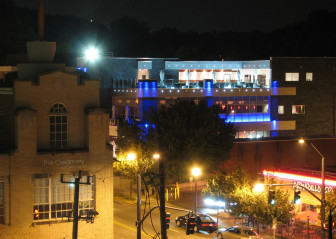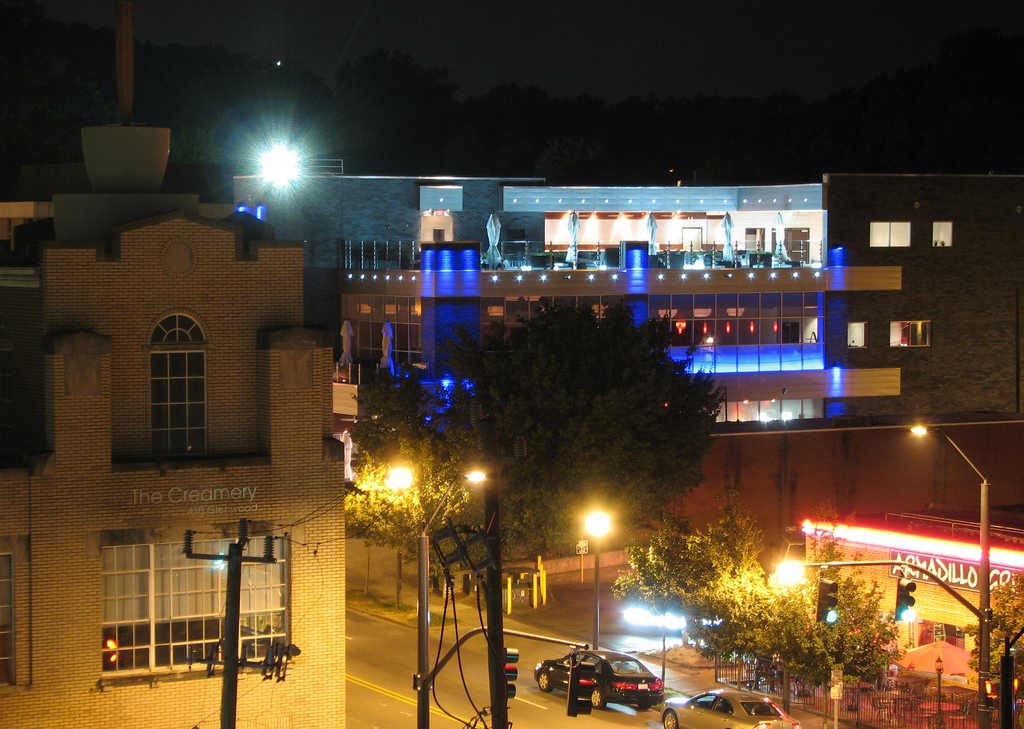City staff, residents and bar owners are working to develop a mediation system that will help alleviate tension between downtown residents and nightclub owners.
Downtown Raleigh Alliance President David Diaz told members of the Law and Public Safety Committee this week that a small task force is still working to get feedback from Glenwood South businesses and residents for the new system. He said he will make another presentation at the next Law and Public Safety Committee meeting.
The system will begin as a pilot program in the Glenwood South district, the source of most club-related noise complaints.

Leo Suarez / dtraleigh.com
A view of Solas and The Creamery building on Glenwood South in downtown Raleigh.
How the Program Works
Bars and clubs will be required to list online a 24-hour contact person for residents to call about noise. The contact person could then address the problem without involving the police department.
The next step will be a meeting with an independent mediator from the police department to help broker a solution.
If the problems persist, the police department could cite a business and the city could revoke or not renew the business’s amplified sound permits.
Noise Issues
Recently, residents and club owners have had disagreements about outdoor amplified sound permits, which allow businesses to play music outside.
“It presents an interesting conundrum for the Council, because we’re actually victims of our own success downtown,” said Assistant City Manager Dan Howe.
Both residents and business owners have expressed discontent with the current system, which involves a quasi-judicial hearing. Quasi-judicial hearings are used for other special-use permits and require expert testimony from sworn witnesses. The process generally pits neighbors against business owners.
Currently there are five outdoor amplified noise permits in a holding pattern while Councilors discuss next steps. Hibernian Pub, Solas Lounge, 606 Lounge, Zinda New Asian and Oxford Gastro Pub all applied for permits last year.
Howe said there are few problems with indoor amplified sound permits, which are approved by city staff.
Part of the issue, he and Diaz said, is that noise is subjective and hard to pinpoint. Noise could sound like it’s coming from one club, but actually be coming from the bar across the street.
“It’s been a very difficult thing to enforce,” said Howe.
While the new program encourages dialogue between residents and businesses, it doesn’t address the ambient noise that occurs after bars close at 2 a.m. Thousands of people enter the streets, which results in a fair amount of noise, Howe said.
Too Many Clubs?
Councilor Thomas Crowder, who isn’t a member of the committee but attended the meeting, said that downtown is reaching its nightclub saturation point and a larger variety of businesses need to move into the area.
Crowder said that before a revitalized Hillsborough Street, the area had so many bars and clubs, the ABC board began limiting how many licenses it would give to businesses in that area.
“We’re going to have to have more police enforcement,” Crowder said. “We need more feet on the ground addressing these quality-of-life issues.”
Crowder suggested using a municipal service district with a special tax to pay for increased police enforcement.
Diaz said the city needs to be proactive about discouraging a concentration of bars and clubs in one area.
The committee will receive more information about the program at its next meeting in April.
